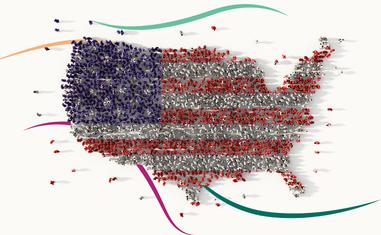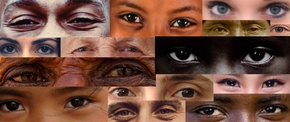The views expressed in our content reflect individual perspectives and do not represent the authoritative views of the Baha'i Faith.
In this season of debates, campaigns, and elections, the Baha’is of the world stand wholly apart from partisan politics. A while back, a puzzled friend asked me to explain what that meant and how it worked.
My friend got our conversation started by sending me an email asking me to join him in campaigning for a political candidate he supports. I told him I wouldn’t be doing that, because Baha’is are entirely non-political and non-partisan. “Wow,” he said, “then how do Baha’is go about changing the world?”
His question contained an interesting and unspoken assumption – that only by entering the partisan political fray could anyone possibly foster meaningful social change. Many people feel this way, but Baha’is look at that equation differently. Instead of relying on partisanship to make change, the Baha’i teachings focus on the powerful change-making apparatus of the human spirit.
All lasting social change, the Baha’i teachings say, starts inside us. We witness the world’s problems and they confront us with an existential choice – do we ignore them or try to do something about them? If we care deeply about others, we’ll obviously want to do what we can to help them. That fundamental choice, essentially a spiritual one, can then define the course of our lives. With sufficient sympathy and empathy for others, our spirits prompt us to try to better their conditions and alleviate their suffering. Conversely, if we fail to respond to the world’s injustices and inequities, we risk starving our lives of the essential spiritual nutrition we need.
The teachings of the Baha’i revelation encourage every one of us to turn our attention to the inner qualities of the human spirit that precede and ultimately become the real basis for all outward change:
… if a soul is endowed with the attributes of true faith and characterized with spiritual qualities he will become to all mankind an emblem of the outstretched mercies of God. For the attributes of the people of faith are justice and fair-mindedness; forbearance and compassion and generosity; consideration for others; candor, trustworthiness, and loyalty; love and loving-kindness; devotion and determination and humanity.
So I responded to my friend’s question first with this quote from a talk Abdu’l-Baha gave in 1912, recorded in The Promulgation of Universal Peace:
When we review history from the beginning of human existence to the present age in which we live, it is evident all war and conflict, bloodshed and battle, every form of sedition has been due to some form of prejudice – whether religious, racial or national – to partisan bias and selfish prejudice of some sort.
Many people view partisan politics as the only route to social change, but Baha’is see partisanship differently – as a bias, a dis-unifying passage to polarized views, as yet another way to separate people from one another, and as an impediment to real change:
Though loyal to their respective governments, though imbued with the love of their own country, and anxious to promote, at all times, its best interests, the followers of the Baha’i Faith, nevertheless, viewing mankind as one entity, and profoundly attached to its vital interests, will not hesitate to subordinate every particular interest, be it personal, regional or national, to the over-riding interests of the generality of mankind, knowing full well that in a world of interdependent peoples and nations the advantage of the part is best to be reached by the advantage of the whole, and that no lasting result can be achieved by any of the component parts if the general interests of the entity itself are neglected. – Shoghi Effendi’s 1947 Summary Statement to the Special UN Committee on Palestine.
“The advantage of the part,” Shoghi Effendi wrote, “is best to be reached by the advantage of the whole …”
Clearly, partisan political warfare attempts to reverse that principle. The basic philosophy of partisan politics maintains that “our” side has to win – then we’ll have power over the other side, and we’ll get what we want.

The Baha’i teachings say the exact opposite – that no one can win unless everyone does: “The Baha’i Faith upholds the unity of God, recognizes the unity of His Prophets, and inculcates the principle of the oneness and wholeness of the entire human race.” – Ibid. This founding Baha’i principle recognizes and incorporates the scientific truth of human interdependence and inter-relatedness into a coherent worldview that builds unity rather than division.
Baha’is don’t engage in partisan politics, not because they want to hold themselves aloof from them, but because partisanship creates enemies. The hyper-partisanship we witness in the world today, and the anger, hostility and even violence that it causes, proves that political wrangling prevents unity.
Do Baha’is Vote?
After my friend asked me how Baha’is change the world without engaging in partisan politics, he had a follow-up question: “What about voting?”
Yes, I told him, Baha’is take their civic obligations seriously, and definitely vote in local and national elections. But rather than voting along party lines or engaging in elections the same way partisans do, Baha’is vote based on the character and the merits of the individual running for office.
This requires work, sometimes demanding even more engagement in civil society than partisans, who may identify solely with candidates from one chosen party affiliation and vote for them without doing the work of investigating their characters and merits as individuals. When Baha’is vote, they do so from a non-political point of view, voting for the person running for office rather than their party affiliation.
What about Social Justice?
“So, without partisan politics, how do Baha’is achieve social justice?” my friend wanted to know.
The Baha’i teachings clearly call on every Baha’i to work for social justice – and to do so humbly and quietly, without boasting or seeking political advantage as a result. In a speech he gave in Paris in 1911, Abdu’l-Baha urged everyone, in uncompromising terms, to act to establish justice:
The wrong in the world continues to exist just because people talk only of their ideals, and do not strive to put them into practice. If actions took the place of words, the world’s misery would very soon be changed into comfort.
A man who does great good, and talks not of it, is on the way to perfection.
The man who has accomplished a small good and magnifies it in his speech is worth very little. …
People make much profession of goodness, multiplying fine words because they wish to be thought greater and better than their fellows, seeking fame in the eyes of the world. Those who do most good use fewest words concerning their actions.
My hope for you is that you will ever avoid tyranny and oppression; that you will work without ceasing till justice reigns in every land, that you will keep your hearts pure and your hands free from unrighteousness.
When asked in 1948 if Baha’is could participate in social justice causes which some might deem “political,” Shoghi Effendi, the Guardian of the Baha’i Faith, advised an individual Baha’i:
Much as the [Baha’is] must guard against in any way ever seeming to identify themselves or the Cause with any political parry, they must also guard against the other extreme of never taking part with other progressive groups, in conferences or committees designed to promote some activity in entire accord with our teachings – such as, for instance, better race relations.
This stance explains the Baha’i community’s long history of working with various groups and movements for the eradication of racism, the promotion of gender equality, disarmament and the cessation of warfare, and many other progressive causes – all without partisanship.
My friend and I wound up talking late into the night, with these ideas all leading to a much longer discussion. Curious and intrigued, he asked many more questions about the unique Baha’i approach to social change, and he said that it felt like he had entered “an alternate reality.” At the end of our conversation, he actually seemed a little stunned. Apparently he had never considered a different approach to partisanship before. He said he wanted to give some serious thought to our discussion, and I expect he will.
If we want to heal our societies from the toxic, disruptive, and essentially dis-unifying effects of partisan political conflict, we all need to emulate my friend and give some serious thought to what could replace that obsolete, outmoded system.

















Comments
Sign in or create an account
Continue with Facebookor